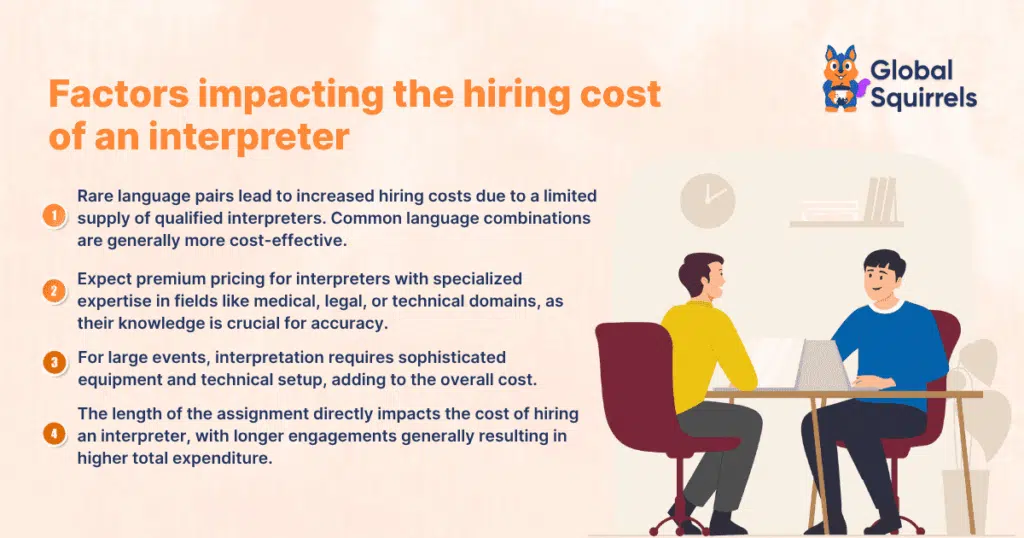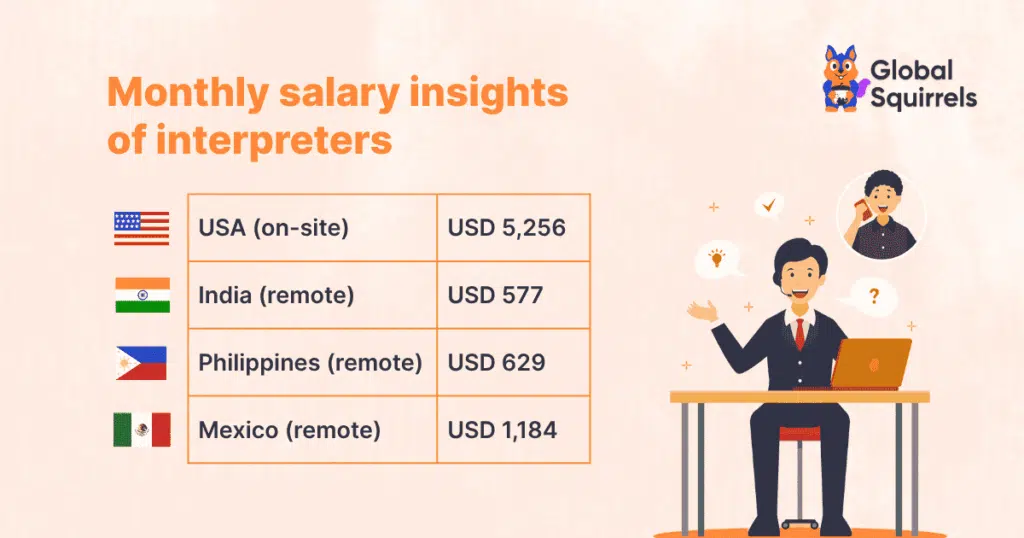How much does it cost to hire an interpreter?

Hiring an interpreter is important to ensure accurate and clear communication in multilingual environments. It could be for business meetings, legal proceedings, medical consultations, or international conferences. However, the cost of hiring an interpreter could vary significantly depending on various factors such as the languages involved, the type of interpretation needed, and the duration of the assignment. Understanding the multiple pricing models and cost factors could help you make an informed decision and budget accordingly. In this blog, we will break down the main elements that influence the cost of hiring an interpreter and provide you with a detailed understanding of what to expect.
What are the factors affecting the hiring costs of an interpreter?
When hiring an interpreter, various factors can affect the overall cost. Understanding these factors would help in making an informed decision and budget accurately for the needs. Some of the main elements that can affect the interpreter hiring cost are:
1. The language pair
The language pair plays an important role in determining the cost of the interpreter. Common languages such as French, German, and Spanish often have lower rates due to the availability of multiple qualified interpreters. However, less common or rare languages such as Zulu, Mongolian, or Icelandic might command higher rates because of a smaller pool of qualified professionals and the need for specialized expertise. The more the language pair is sought-after and rare, the higher the cost.
2. The type of interpretation
The nature of the interpretation service your company provides also impacts the hiring cost. The two most common types of interpretation are:
- Simultaneous interpretation: This type of interpretation will involve the interpreter translating the spoken word in real-time, which is often during conferences or large events. Because of the complexity and skill needed, the hiring cost will be on the higher side.
- Consecutive interpretation: In the consecutive interpretation, the speaker will pause occasionally to allow the interpreter to translate. It is often used in smaller meetings or interviews and tends to be less expensive than simultaneous interpretation.
Pricing may also be impacted by specialized fields such as technical, legal, or medical interpretation. Legal interpreters, for instance, must be knowledgeable about legal jargon, which frequently leads to higher interpreter pay.
3. Duration of the assignment
The length of the assignment is another important factor in pricing. Interpreters could charge either hourly or daily rates, with the larger assignments costing more. Short-time assignments, such as a one-hour meeting, will usually cost less than multi-day conferences or events. Additionally, some interpreters could offer discounts for long-term engagements or bulk hours.
4. Location
Interpreter costs vary from place to place because of the differences in living costs and demand. Hiring an interpreter in high-demand countries or cities is usually more expensive than in regions with a lower demand. For in-person assignments, travel expenses could also be additional costs if the interpreter needs to travel.
5. Certification and experience
Experienced and certified interpreters will be more expensive than professionals without any formal qualifications. Interpreters who have undergone training and hold certifications such as ATA or the American Translators Association and CIOL or the Chartered Institute of Linguists are more likely to provide a higher level of accuracy and expertise, which is especially true for specialized fields.
6. In-person or remote interpretation
Whether the service is performed in person or remotely can also affect the cost of hiring an interpreter. Travel time and extra planning are frequently needed for in-person interpretation, which might raise the price. However, in cases where no travel is involved, the remote interpreter’s cost could be significantly lower.
Comparing remote vs on-site interpreter costs
When hiring an interpreter, one of the primary decisions to make is to choose between a remote or on-site hire. The breakdown on how the costs differ for both on-site and remote interpreters is given below:
1. Remote interpretation: Accessibility and cost efficiency
Remote interpretation can be done through phone, video conference, or other digital platforms, which will tend to be more affordable than on-site interpretation for multiple reasons, such as:
- No travel expenses: With a remote interpreter, there will be no travel or accommodation costs, thus making it a more viable option, especially for short-term engagements.
- Low overhead costs: Remote interpreters will work from home or dedicated studios, therefore, cutting down on the overhead that would typically go into setting up an on-site interpretation.
- Language complexity: For simple or less specialized language pairs, remote interpretation is typically affordable and sufficient. However, for more complex or rare languages, the cost could rise even for remote services. Even when hiring remotely, you will have to pay more for specialized medical, legal, or technical translators due to their expertise in complex language pairs like Mandarin-Arabic or Japanese-French.
2. On-site interpretation: Higher costs but great precision
On-site interpretation will involve simultaneous or consecutive interpretation at meetings, events, or conferences, and also comes with additional costs like:
- Accommodation and travel: If the interpreter travels to the location, you will be required to cover lodging, food expenses, and transportation.
- Equipment for rent: For events that require simultaneous interpretation, you will be required to rent special equipment like headsets and microphones, which can add to the overall cost.
- Coordination and setup: On-site interpretation could require time for setup and coordination, especially for large events or multiple assignments.
- Complex language pairs: You can hire on-site interpreters for complicated jobs that need face-to-face communication. Being present on-site can help the interpreter better capture the subtleties of the conversation, such as in technical or legal interpretations where accuracy is essential.
Hourly, daily, or project-based: Understanding interpreter pricing models
When hiring an interpreter, understanding the various pricing models is important to ensure that you are getting the right service at a reasonable price. Interpreter costs could vary depending on several factors, which include the types of interpretation, duration of the assignment, language pair, and the experience of the interpreter. Some of the most common pricing models for hiring interpreters are:
1. Hourly rates
Hourly rate is the most common pricing model for short-term assignments or one-time events. Interpreters will charge based on the total number of hours worked, with rates generally depending on the language pair, the type of interpretation, and the expertise required.
Hourly rates are perfect for small assignments like meetings, interviews, or consultations. It is also common for interpreters to have a minimum booking time, which typically ranges from 2-4 hours.
2. Daily rates
For longer assignments, especially those that span an entire day, such as conferences, training sessions, or seminars, interpreters will charge a daily rate. The daily rate is often cost-effective for longer engagements and is based on a full workday, which is usually around 7-8 hours.
3. Per-project pricing
In some cases, interpreters will offer a flat-rate price for certain projects. This model is common when you have a clear scope of work, such as one-time events, translating a document, or a fixed set of sessions. This model will provide clarity on a budget, especially for multi-day or large projects, and can be useful for business or conference planning.
4. Remote interpretation pricing
Since there are no travel or lodging expenses associated with remote interpretation, i.e, via phone, video call, or internet platforms, the pricing model is usually less expensive than on-site interpretation. In most cases, remote interpreters bill on an hourly or daily basis. Because interpreters don’t have to pay for equipment rental or logistical travel, rates for remote interpretation may be a little lower.
How to minimize costs while hiring an interpreter?
Hiring an interpreter for your business does not have to be an expensive ordeal. Whether you are conducting international meetings, legal proceedings, or global conferences, there are multiple ways you can reduce the costs of hiring an interpreter. Some tips to help you reduce the overall cost of hiring an interpreter without compromising on quality are:
1. Choose freelancers/independent contractors
The hiring cost of full-time on-site interpreters in the USA will be significantly high since their pay will include salary, benefits, overhead expenses, and other allowances. To reduce your costs, consider hiring freelancers/independent contractors. This strategy is ideal for short-term or temporary projects typically ranging from a few days to a couple of months.
2. Access the global talent pool
Targeting countries with lower labor costs will open up access to a huge talent pool. Various emerging economies have a highly educated and skilled workforce in fields like technology, engineering, finance, and creative services. These workers will bring a fresh perspective and special skills that may not be as readily available in higher-cost regions.
3. Leverage an Employer of Record (EOR)
When hiring interpreters remotely from other countries or regions, the complex issues of international employment, tax regulations, and legal requirements could lead to higher costs and administrative burdens. By leveraging an EOR, businesses can bypass these challenges, as the EOR manages all the legal and compliance aspects of hiring.
What are the challenges with hiring a remote interpreter?
While remote interpretation will offer multiple benefits like reduced costs and wider accessibility, there are also challenges to keep in mind. Hiring a remote interpreter will require careful planning and understanding of the potential challenges that may arise during the process. Below are some of the key challenges you might encounter when hiring a remote interpreter:
1. Confidentiality and security issues
Digital platforms are frequently used to share sensitive information for remote interpretation. Maintaining security and secrecy is essential if you work in fields like law, banking, or healthcare. Virtual platforms might not always provide the security needed to manage private discussions.
2. Compliance issues
When hiring a remote interpreter, compliance with industry regulations, local laws, and data privacy can become complicated. Especially when working with interpreters from around the globe, there could be concerns about ensuring that the interpretation is done in a way that adheres to the regional laws.
3. Productivity tracking challenges
Because remote translators sometimes operate autonomously, unlike in-house staff, it can be challenging for businesses to properly monitor productivity. It can be difficult to make sure the interpreter is giving the task at hand the necessary amount of time and attention when they are not physically there.
How Global Squirrels simplifies hiring an interpreter
Global Squirrels is a staffing and payroll agency that sources, hires, and onboards top talent based on the job requirements. Additionally, our staffing platform has in-built remote talent management tools such as multi-country timesheet and leave management, one-time or recurring task assignment, and a tracker to ensure the offshore resources are productive and aligned with the project’s goals. Here is how Global Squirrels and its EOR solution could help you in overcoming the above challenges with hiring an interpreter.
1. Overcoming the security issues
Our platform will help companies mitigate risks associated with absconding through the offer letter or agreements, which will ensure that the contractor or full-time talent will work dedicatedly on your project. These documents will clearly define the scope of work, exit formalities, and other company policies, thus ensuring zero risk to the company.
2. Simplifies global compliance
Global Squirrels will help you by managing the foreign labor laws, tax requirements, and categorization concerns. As the Employer of Record (EOR), our platform will manage the legal agreements, benefits, international payroll, and compliance for every nation where you want to hire. This will reduce the risk and guarantee that the company complies with regional laws without requiring you to invest in infrastructure or retain legal counsel.
3. Performance monitoring
One of the most frequent problems with managing remote talent is the lack of visibility into performance and tasks. You can allot one-time or recurring tasks to the remote workers with a single click. Managers and employees can see task statuses at a glance, thus ensuring accountability and transparency.
What is our Orange Plan? How does it work?
If you are looking to hire an interpreter, the Orange Plan from our pricing plans would be a great fit since it covers recruitment and EOR support. To onboard your self-sourced talent, our Purple Plan will handle this and also manage the payroll and administration. However, if you prefer having better oversight, choose the Blue Plan to hire an interpreter who will work from one of our managed offices in India, the Philippines, or Mexico.
Steps to hire top interpreters by choosing the Orange plan are:
- Sign up or log in and post your job requirements, along with your chosen hiring location.
- In 2-5 business days, you will receive an email notification to review three curated profiles on the portal.
- Conduct interviews and shortlist your ideal candidate for onboarding.
- Review and approve the offer letter and pay your new hires’ onboarding deposit (one-month hiring cost equivalent to the payroll cost and flat license fee)
- Global Squirrels will onboard the interpreter and handle all HR-related duties, such as payroll, benefits, and compliance.
Hiring a top remote interpreter does not have to be complex or expensive if you choose the right staffing partner!
Does this interest you?
You can also take a tour to understand how our platform works.
Want to hire a top interpreter for your project? Sign up and post your job for free!


